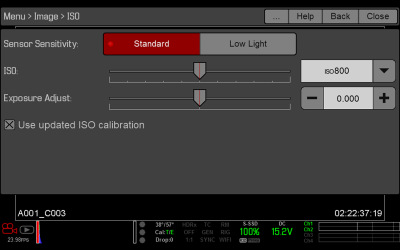Sensor Sensitivity
Select a Sensor Sensitivity:
- Standard: Use in normal shooting conditions in which you would expose near ISO 800. Provides the best highlight retention.
- Low Light: Use in lower light conditions in which you would expose for ISO 2500 and higher. Provides the cleanest shadow detail. When Low Light is selected, the LL symbol appears next to the ISO rating on both the ISO menu and in the Upper Status Row. For more information, go to Upper Status Row (Basic Menu).
When you switch between Standard and Low Light, the camera applies the correct sensor calibration for the sensor sensitivity. For more information, go to Sensor Calibration.

Figure: ISO Options for Standard (left) and Low Light (right)
ISO
NOTE: To see the full range of ISO ratings, select ISO in the Upper Status Row, select Edit List, and select Custom.
Select the camera ISO rating. The sensitivity value increments in 1/3 stops. When the ISO rating is adjusted, the camera logs the change as metadata and the monitor path reacts accordingly. Higher ISO values lead to brighter images in the monitor path, and vice versa.
RED recommends setting the ISO to the default, then adjusting the aperture, lighting, and ND filters to match. The ISO can later be adjusted around one (1) stop for fine-tuning.
The camera shows a different default ISO range based on the Sensor Sensitivity option. You can expand this list by opening ISO from the Upper Status Row and selecting Edit List. For more information, go to Feature: Edit List.
- Standard: ISO 250 to 1,600. Default is ISO 800.
- Low Light: ISO 1,600 to 12,800. Default is ISO 3,200.
FLUT
NOTE: This feature is only available in Legacy mode. For more information, go to Image Pipeline.
Floating Point Lookup Table (FLUT) is an exposure control exclusive to RED. FLUT works like a traditional ISO setting, but can be fine-tuned in post production to any level of exposure precision. FLUT automatically protects highlights and shadows, even when changed substantially.
The FLUT setting is expressed in terms of relative exposure value (EV), where each unit represents a 1-stop change in midtone exposure level. Range is –8.0 to 8.0. Default is 0.0.
Shadow
NOTE: This feature is only available in Legacy mode. For more information, go to Image Pipeline.
Shadow adjusts the toe value of the FLUT (the tone near black). Increasing the Shadow value raises the video level of near blacks. Lowering the Shadow value crushes the video level of near blacks. Range is –2.0 to 2.0. Default is 0.0.
Exposure Adjust
NOTE: This feature is only available in IPP2 mode. For more information, go to Image Pipeline.
Exposure Adjust (called FLUT in firmware v6.3 and earlier) works like a traditional ISO setting, but can be fine-tuned in post production to any level of exposure precision. Exposure Adjust automatically protects highlights and shadows, even when changed substantially.
The Exposure Adjust setting is expressed in terms of relative exposure value (EV), where each unit represents a 1-stop change in midtone exposure level. Range is –8.0 to 8.0. Default is 0.0.

Figure: Exposure Adjust (Available in IPP2 Mode)
ISO Calibration
RED cameras with HELIUM®, MONSTRO®, and GEMINI® sensors have an ISO calibration that better matches a light meter and improves overall exposure quality. RED cameras with HELIUM, MONSTRO, and GEMINI sensors therefore depict a one stop brighter image compared to prior sensors (when set to an otherwise identical ISO, T-stop, and shutter speed). ISO 400 now appears as bright as ISO 800 did before, for example.
To match exposure between cameras with HELIUM, MONSTRO, and GEMINI sensors and RED cameras that DO NOT have those sensors, either reduce your camera’s ISO speed by 1 stop compared to the other camera, or deselect the Menu > Image > ISO > Use updated ISO calibration check box.
As usual, RED recommends using ISO 800 as a starting point for exposure, then adjusting the T-stop and lighting or ND filters to match.